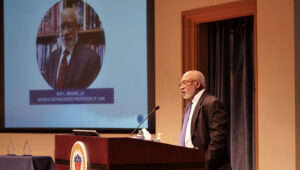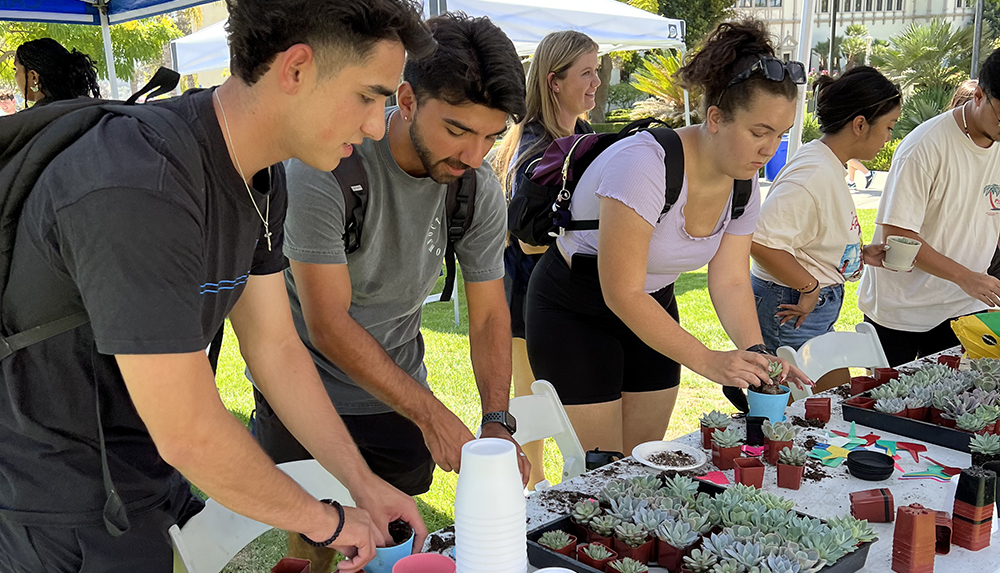
American History cannot be told without recognizing the hardships and oppression black Americans have faced since the beginning of our country. Black scholars in todays world are still being faced with unequal opportunities and challenges that hinder their ability to gain a higher education. At the Roy L. Brooks Distinguished Lecture Series, Dr. Derrick R. Brooms discussed how to make black experiences at college more supportive. Dr. Derrick R. Brooms is an accomplished scholar and professor of sociology at the University of Tennessee Knoxville. He is widely recognized for his work on issues of race, education, and social inequality. Dr. Brooms’ research focuses on the experiences of Black students in higher education, with major emphasis on their social and cultural experiences as black men and women. He has also conducted extensive research on the impact of race on social class mobility and the experiences of first-generation college students. In his research, Dr. Brooms explores the ways in which social and cultural factors impact the educational experiences of Black students, and he advocates for policies and practices that promote equity and inclusion in higher education. Dr. Brooms’ work has been widely recognized for its impact and significance. In addition to his research, Dr. Brooms is very proud to be a girl dad, attributing that as his number one quality. Dr. Brooms is an engaging and dynamic educator, known for his ability to connect with students and create a classroom environment that fosters critical thinking and engagement. His commitment to social justice and equality is evident in all aspects of his work, and he is widely respected for his contributions to the field of sociology and higher education.
Dr. Derrick R. Brooms discussed the hardships black scholars face while working towards higher education, comparing it to “walking on a tightrope”. Many black scholars choose to attend Hispanic- Serving Institutions, HSI’s, or Historical Black Colleges and Universities, HBCU’s, due to the more inclusive nature of these universities. However, many times needs are left unmet due to black boys being interpreted differently than white or Hispanic students at the same institutions. Brooms questions how we can create environments so that black boys and men can succeed. Through stories of his life and lessons he has learned through his various levels of education, Brooms tries to answer these questions.
Fostering an environment of trust, acceptance, and acknowledgement is key to promoting equality in higher education for black scholars. Universities must take extra steps to ensuring the success of their black students by providing resources and support to those who have received little to no help throughout history. Dr. Brooms discussed his time studying as challenging, due to the little help he received from faculty. In a heartfelt story, Brooms discussed how his professors were not the ones who built him up and supported him, but the lunch ladies Gloria, Verna, and Mary were the only people who really checked up on him. The only black admissions officer was also one of the few people who made sure he was on the right track. Universities must take the steps to ensuring black success in the future. This can be accomplished by actively recruiting and hiring Black faculty and staff, as well as by creating programs and initiatives that support the enrollment and retention of Black students. Diversifying the curricula and ensuring all perspectives in all areas of study also help to protect the success of black students no matter what field they intend to study.
The struggles of black scholars today can be tied back to the beginning of our history. In Chapter 16 of Freedom on My Mind, the section titled “The Fight for Education” shows the struggles to obtain education. Black women led the fight in hopes of creating a world where their children could be presented with the same opportunities for education as their white counterparts. Black children were receiving subpar education and achievement levels were lower, while dropout rates were exponentially higher than white children. With that being said, Dr. Brooms suggested that black education today should not be compared to white education. He argues that black education is unique and the white standard skews black experience. While not comparing white education and black education, why, even decades later, is this still a problem being faced by black children and black scholars of all educational levels? When will our education system finally be inclusive enough and supportive enough for black American scholars to succeed at elementary and university levels? While our country has made progress in the sense that schools are no longer segregated and racism is tremendously less common than during the Civil Rights Movement, this does not undo the past and there must be programs put in place for reparations. Black students have been oppressed for centuries, and the education system has got to change in order to continue progressing towards a more equal system.
In order to move towards an equal education system on all levels, Universities must fight to be inclusive, whether that means implementing different programs or hiring more black faculty, etc. However, in an academic journal article, written by Stuart Woodcock, Kathy Gibbs, Elizabeth Hitches, and Chloe Regan, they discuss the importance of the teachers as well. Even if Universities implement inclusive programs and work with black scholars to ensure their success, teacher probably play the biggest role in education and a student’s success. Woodcock, Gibbs, Hitches, and Regan argue that teachers must be, “responsive to the strengths and needs of their diverse students in order to provide a fair, equitable and quality education for all”. If teachers are not on board with the programs put in place to help students, the programs are essentially useless in nature. While every student has a story about a bad teacher or professor who did not like them, black students are more likely than not to have more than one teacher who dismisses them from the beginning due to their skin color and the stereotypes that follow them around. Education is a system, and in order for it to get better, all participating parties must work in unison to make it better for all students, especially those who have been oppressed for so long.
In conclusion, the narratives and themes of black struggles in education are critical to our understanding of African American history. These struggles highlight the discrimination that has shaped African American experiences and serve as a reminder of the ongoing struggle for equality in education.By understanding the history of Black struggles in education, we can gain insight into the broader history of African American resistance and activism. Black students and scholars have played a critical role in advocating for equal rights and opportunities in education, and their efforts have helped to pave the way for progress in other areas of American society. From the Civil Rights Movement to the present day, Black students and scholars have fought to make educational institutions more equitable and inclusive, and their stories serve as a source of inspiration and empowerment for future generations.Furthermore, understanding the experiences of Black scholars and students in higher education is essential to promoting equality in education. Universities and colleges can take important steps to create a more inclusive environment for Black scholars and students, including increasing representation and providing support and resources. By taking these steps, universities can create an environment in which all students and scholars can thrive.Overall, the narratives and themes of Black struggles in education are an essential part of African American history. They highlight the ways in which racism operates in educational institutions and society as a whole, and provide inspiration and insight for future generations. By understanding the history of Black education struggles and working to create a more equitable and inclusive educational system, we can help to build a more just society for all.
Works Cited
White, Deborah Gray, Mia Bay, and Waldo E. Martin Jr. Freedom on My Mind: A History of Americans with Documents. Bedford/St. Martin’s, 2013.
Woodcock, Stuart, et al. “Investigating Teachers’ Beliefs in Inclusive Education and Their Levels of Teacher Self-Efficacy: Are Teachers Constrained in Their Capacity toImplement Inclusive Teaching Practices?” Education Sciences, vol. 13, no. 3, Mar. 2023, 280. EBSCOhost, https://doi-org.sandiego.idm.oclc.org/10.3390/educsci13030280
